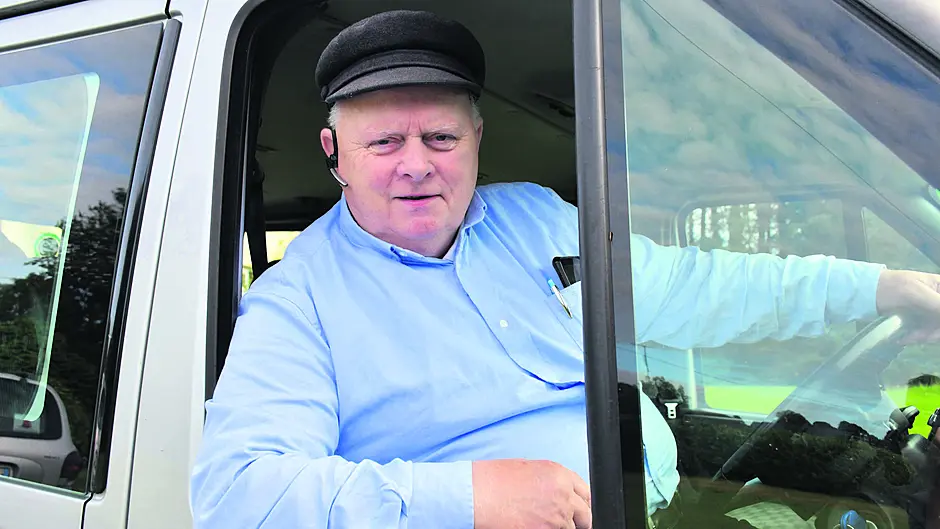DIFFICULT tests and a lack of drivers willing to work unsocial hours have resulted in a shortage of night-time taxis in West Cork.
The tests on industry and local area knowledge must be passed before drivers can get an SPSV taxi licence from the National Transport Authority (NTA).
Area knowledge involves studying county maps, and noting important landmarks, street names and being aware of the most direct routes, for instance.
The NTA told The Southern Star that the questions are reviewed periodically and a review is currently underway.
Sandra Regan O’Shea and her family have owned and managed Beara Cabs for over 20 years. Sandra said the often challenging exams are preventing people from entering the profession, particularly when the questions are not relevant to the areas in which they operate.
‘It’s very difficult for drivers to get licences with the exams they have to sit and study,’ she said.
This is just one of the issues the industry is facing. Rosscarbery taxi driver John O’Sullivan said it is also ‘impossible’ to get drivers for night shifts.
As a result, the public are finding it increasingly difficult to get taxis at peak times, like Saturday nights, between 11.30pm and 2am, when demand is very high.
‘On a Saturday night now I stay local. I do Rosscarbery and Clonakilty that’s it – you can’t go any further at peak times,’ he said.
Sandra agreed, adding that the demand at night is uncertain too, particularly at off-peak times. Her company also provides daytime services such as school runs, and they have no problem getting drivers for these journeys.
‘Nobody wants to work at night,’ she said, ‘and having drivers free and available in the morning is not feasible if they have worked through the night.’
One taxi driver in Bantry said they do not offer any services at night because it is too difficult to get drivers and the nighttime trade is unpredictable.
‘Half an hour (waiting) means nothing to someone who’s after a shot of pints at 2am in the morning,’ they said. Eric Murphy, who has been running Murphy Cabs in Bandon for 28 years – with 23 vehicles on the road – said he doesn’t operate at night because he just cannot get drivers to work.
He found that after Covid, it was proving impossible to hire drivers.
‘Going back 20 years ago, I would have probably six or seven cars on the road at night and all the lads were on cash so the cash driver is gone,’ he said.
‘Covid put it to bed for a while and then you had a scenario where people were getting too much money on the PUP payment. Anytime I went advertising for drivers the first question I would get is how much cash can I give them, or can they be hired off the books.’
After lockdown, people didn’t want to work more than 40 hours a week.
There seems to be a ‘stigma’ about taxi driving at night, he said, but insurance issues are also affecting the business.
‘The insurance companies have us to the wall and every driver has to be an employee of mine to be covered to drive. If there was an incident on the vehicle I would love to have payslips from the week before and a P60 from the year before. The NTA also brought out regulations whereby all PSV operators must link with them prior to taking them on the road.’
Eric said this move is taking a load of drivers off the road. The area knowledge test is the other sticking point.
‘No one wants to do that area knowledge test as they are being asked about housing estates in Cork city when they work down in West Cork. The NTA isn’t really fit for purpose in the way they are operating and their legislation is so outdated it hasn’t kept up with technology either.’
He said that Uber model cannot operate in Ireland because every driver operating as Uber has to have licensed vehicles under the Taxi Regulation Act.
‘Your car must be a licensed vehicle, while in Canada for example, you can use your private car.’
He said he also knows of at least five unlicensed operators driving in the Bandon area who have no garda vetting and drive their own private cars.
‘People using them are putting themselves at risk, because these drivers are not vetted and you could be dealing with assaults or anything.’
In Skibbereen, Declan Croke, owner of Dolphin Cabs, said there is a definite shortage of taxis in the town at weekends.
‘There are quite a few licences in Skibbereen, but not too many want to work too late anymore,’ said Declan. ‘It needs younger drivers and there are no younger drivers coming into the business.’
Declan agreed the theory test is an issue for people hoping to enter the industry in West Cork, as questions can relate to Mallow or Cobh, for instance.
‘If you go to do the theory test, they’re going to ask you questions about the whole of Cork. And Cork is a big county,’ he said.
Another Skibbereen taxi driver, Declan Coakley, owner of Blue Sky Cabs, said that during the week in town there isn’t much demand for taxis after 11.30pm.
‘Before I used to work until 4am, 5am or 6am – but I wouldn’t do that anymore, unless it was worth my while,’ he said.
Declan said some people might have had trouble getting taxis over the bank holiday weekends in June and August, but that there’s no problem outside of peak times.
This issue is not only impacting taxis. Hospitality businesses are also suffering because people are less inclined to go out at night if they cannot guarantee a way to get home.
Danielle Delaney, Chairperson of the Bantry Business Association, said the lack of transportation at night is deterring people from going out.
‘People want to go out, they want to have fun, they want to hear music and see shows and things, but it is an issue for people who don’t live in town being able to get home,’ she said.
Don O’Sullivan, owner of The Hub nightclub in The Munster Arms Hotel in Bandon, echoed this sentiment.
The lack of taxis in Bandon is definitely preventing people from going to town at night, he said.
‘It’s having a huge impact. They may give a spin to town earlier, but people can’t get home,’ he said. Don said this isn’t the taxi drivers’ fault as licences and insurance costs are an issue for them, but nonetheless, the lack of services is impacting nightlife.
‘It has a huge effect,’ he said, ‘and I don’t know how it’s going to change.’
Alper Hackett, owner of Hackett’s Bar in Schull, said the lack of access to transport in rural Ireland is limiting people. He said there are currently two issues – firstly rural pub- lic transport is very limited, and secondly, he has noticed a lack of transportation for people with disabilities and older people.
‘Accessibility is so important,’ he said. ‘Rural transportation needs to improve.’ Government transport policies need to be made with rural businesses and rural people in mind, said Alper.
Deirdre Tinkhof at Schull Tourist Office said it is hard on people who come to Schull on holidays too.
‘The businesses are definitely suffering because you’ll see that people are staying at home, having barbecues and going to the off-licence rather than going to local pubs, because they can’t get home after.’
The Calves Week sailing event and other summer peak times remain very busy in Schull but, she said, for the rest of the year it isn’t feasible for a lot of the pubs to open their doors because people have no way home.
‘Over a twelve-month period, it does have an adverse effect on businesses,’ said Deirdre.
Former county mayor Danny Collins told The Southern Star that the test is certainly another issue, deterring many people from becoming drivers. He said the questions are often difficult or irrelevant.
‘Most towns and villages like Glengarriff and Schull and different areas around West Cork are suffering,’ he said.
Skibbereen-based Fianna Fáil Cllr Joe Carroll said the taxi shortage is also having a serious effect on tourism.
‘The government has been bringing in public transport all over Dublin,’ he said. ‘But there’s no public transport in rural Ireland, and if people want to get out and socialise, they need public transport, or they need to get taxis – that’s the bottom line.’
In response, the NTA told The Southern Star the threshold for passing the test is considered appropriate ‘to the delivery of professional, high quality SPSV services to the general public.’
Furthermore, following a public consultation in 2016 to improve the SPSV test – many changes were introduced in 2017.
The pass rate was reduced from 80% to 75% and drivers can appeal their test results, for instance, they added.
(Additional reporting by Kieran O’Mahony).









